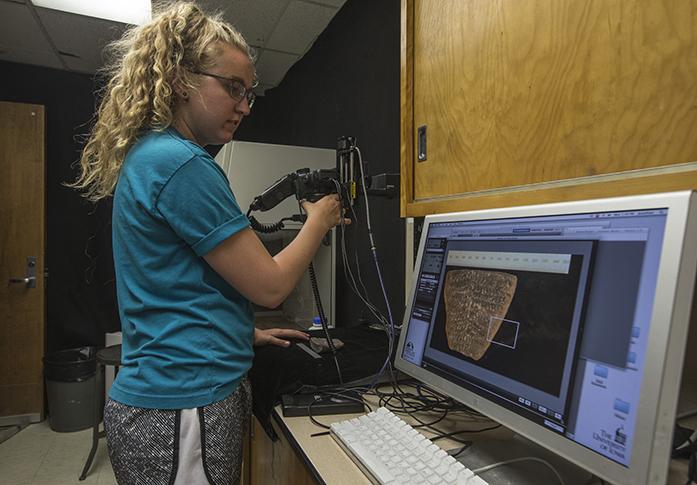By Zach Weigel
zachary-weigel@uiowa.edu
The University of Iowa Paleontology Repository is trading relaxation for restoration as it works to digitize its plant fossil collection.
Tiffany Adrain, the collections manager of the repository who spearheads the project, said digitizing the UI’s plant fossil collection will make the specimens more accessible for researchers and expand the group’s outreach to the public.
“Our digitization project is to get the collections online so they can be accessible to researchers and the public worldwide,” she said. “Our current grant is for curating the fossil plant collection so that we can do this digitization.”
The Paleontology Respiratory received a grant from the National Science Foundation for $196,751 to rehouse the fossil plant collection to preserve it and make it physically accessible for cataloguing and digitization.
This summer, Adrain and her team are organizing, photographing, and cataloguing nearly 20,000 plant fossils into an online database. The grant allows the repository to purchase cabinets to store the complete collection and cover the overhead costs of IT support, various supplies, and travel.
“This will give researchers the ability to efficiently access information on these collections,” said UI junior Hanna Grissell, a student assistant in the digitization process. “As well as increase the chances for our repository to send these collections out on loan or have researchers come here to study them.”
Previously, the collection was spread among the Oakdale Research Facility, Halsey Hall, and Trowbridge Hall, but renovations to Trowbridge in 2014 made it possible to centralize the entire collection there.
“Digitizing the entire collection is an enormous task,” she said.
The digitization of the UI plant fossil collection is scheduled for completion by the end of the 2017 spring semester.
The plant collection is not the only UI project involved in the process. Trilobites, corals, micromammals, and conodonts are all part of an ongoing digitization project that started in 2004.
Large grants helped provide funding for equipment, supplies, and materials to support digitization of collections and specimens and wages for student assistants, said Trina Roberts, the director of the Pentacrest Museums.
“Digitization is a great way of enhancing the scientific value of our collections, although obviously no digital image or data point replaces the physical specimens themselves,” she said.
The UI Museum of Natural History in Macbride Hall is also digitizing some of its zoological specimens, including the insect collection and rehousing the bird collection while updating the vertebrate specimens.
“We are really bringing the UI natural-history collections out of the dark and into the world’s research spotlight,” Adrain said.



